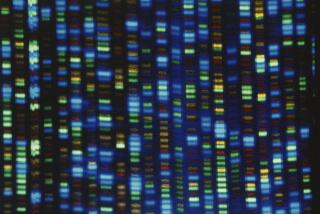Hospital Establishes Umbilical Cord Blood Bank
- Share via
OAKLAND — An umbilical cord blood bank was established Friday at Children’s Hospital for families nationwide who want to save the blood-rich cords for siblings with fatal blood diseases.
The hospital, which also will begin cord blood transplants later this year, joins three other medical centers funded by the National Institutes of Health to collect umbilical cords for bone marrow transplants.
Duke University, Georgetown University and UCLA are gathering thousands of units of cord blood from donors unrelated to patients, particularly from minorities, said Elaine Sloan of the National Heart, Lung and Blood Institute.
But Children’s Hospital received $900,000 to collect cord blood from the newborn siblings of children with sickle cell anemia and thalassemia, both blood disorders in which the only hope for survival is a bone marrow transplant, said program director Dr. Bertram Lubin.
“We’re going to collect samples for any family in the United States who already has a child with a disease that could benefit from a transplantation,” he said.
The program will help physicians determine whether cord blood from family members is more successful in transplants than that from unrelated donors.
Umbilical cords will be collected at birthing sites and sent to Children’s Hospital within 24 hours. The hospital will isolate the bone marrow cells, type the tissue and screen the blood for infectious diseases--all free of cost, Lubin said.
The hospital has already collected 50 samples, and two transplants using cord blood successfully cured young patients of thalassemia, a fatal genetic disease that prevents the body from producing enough red blood cells, he said.
Matches between bone marrow donors and recipients are extremely difficult to make, even among siblings, and are particularly rare for minorities.
Blood producing cells, called stem cells, from discarded umbilical cords are “immunologically immature,” making it more likely they will prove a match, Lubin said.
“The advantage of cord blood is you don’t have to be completely compatible. It gives them an additional option.”
Some say that cord blood transplants, still in the early stages of research and trial, could one day replace painful and risky bone marrow transplants.






